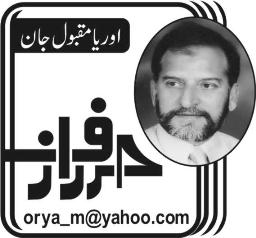ISLAMABAD: Air Marshal Muhammad Hosni Sayyid Mubarak has been the President of Jumhuriyah Misr al-Arabiyah for 30 years. At 82, the president has plans of gifting the presidency to Gamal Al Din Mohammed Hosni Sayed Mubarak, his younger son, as if the Arab Republic of Egypt is the president’s personal estate.
Martyrs are needed for incidents. Incidents are needed for revolutions. And, revolutions are needed for progress. Revolutions are about public discontent leading to breakdown of the established order. Revolutions are spontaneous with roots in areas that are disenfranchised both politically and economically. Revolutions begin outside the centres of power in areas where government writ is weak and then move towards the centre of power.
The uprising in Egypt began in Cairo, Hosni Mubarak’s centre of power, and then spread eastwards to Suez, northbound to Mansoura and westwards to Alexandria. Intriguingly, protesters in Cairo, Suez, Mansoura and Alexandria specifically targeted police stations and local chapters of the National Democratic Party. Interestingly, protesters were all without guns.
An uprising spurting from within the centre of power clearly indicates that a powerful faction from within the leadership is either guiding or managing the outbreak. It isn’t a revolution but a war of succession. In all probability, a powerful faction very close to the centre of power disagrees with Hosni Mubarak’s plans of gifting the presidency to Gamal and the entire upheaval is being stage managed to bring about the desired result.
The Egyptian theatre now has four key players — Lt Gen Sami Annan, Chief of Staff of the Egyptian Army, Field Marshal Mohammed Hussein Tantawi, Defence Minister, Air Marshal Ahmed Shafiq, Minister for Civil Aviation, and Lt Gen Omar Suleiman, the intelligence chief. Of the four, Lt Gen Annan commands 468,000 troops, Field Marshal Tantawi oversees 60,000 Republican Guards while Lt Gen Suleiman is rumoured to be ailing.
President Mubarak is playing out the last of his tricks. If protests continue even after the dissolution of the parliament, chances are Mubarak would be eased out. Lt Gen Sami Annan will have the last word and Air Marshal Ahmed Shafiq may be a good compromise candidate to replace Mubarak.
Martyrs are needed for incidents. Incidents are needed for revolutions. And, revolutions are needed for progress. Revolutions are about public discontent leading to breakdown of the established order. Revolutions are spontaneous with roots in areas that are disenfranchised both politically and economically. Revolutions begin outside the centres of power in areas where government writ is weak and then move towards the centre of power.
The uprising in Egypt began in Cairo, Hosni Mubarak’s centre of power, and then spread eastwards to Suez, northbound to Mansoura and westwards to Alexandria. Intriguingly, protesters in Cairo, Suez, Mansoura and Alexandria specifically targeted police stations and local chapters of the National Democratic Party. Interestingly, protesters were all without guns.
An uprising spurting from within the centre of power clearly indicates that a powerful faction from within the leadership is either guiding or managing the outbreak. It isn’t a revolution but a war of succession. In all probability, a powerful faction very close to the centre of power disagrees with Hosni Mubarak’s plans of gifting the presidency to Gamal and the entire upheaval is being stage managed to bring about the desired result.
The Egyptian theatre now has four key players — Lt Gen Sami Annan, Chief of Staff of the Egyptian Army, Field Marshal Mohammed Hussein Tantawi, Defence Minister, Air Marshal Ahmed Shafiq, Minister for Civil Aviation, and Lt Gen Omar Suleiman, the intelligence chief. Of the four, Lt Gen Annan commands 468,000 troops, Field Marshal Tantawi oversees 60,000 Republican Guards while Lt Gen Suleiman is rumoured to be ailing.
President Mubarak is playing out the last of his tricks. If protests continue even after the dissolution of the parliament, chances are Mubarak would be eased out. Lt Gen Sami Annan will have the last word and Air Marshal Ahmed Shafiq may be a good compromise candidate to replace Mubarak.







